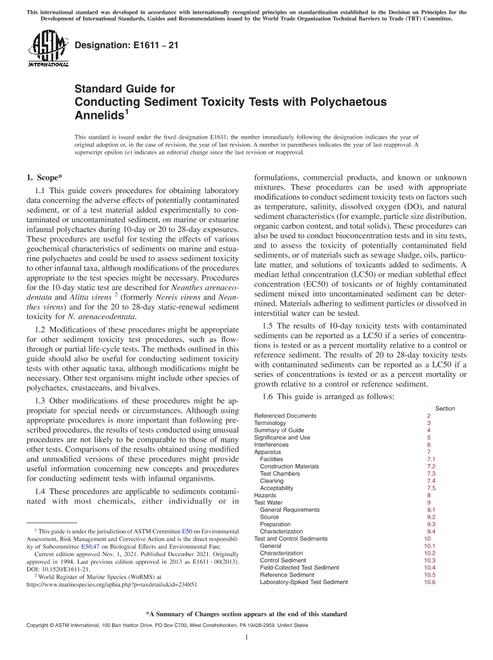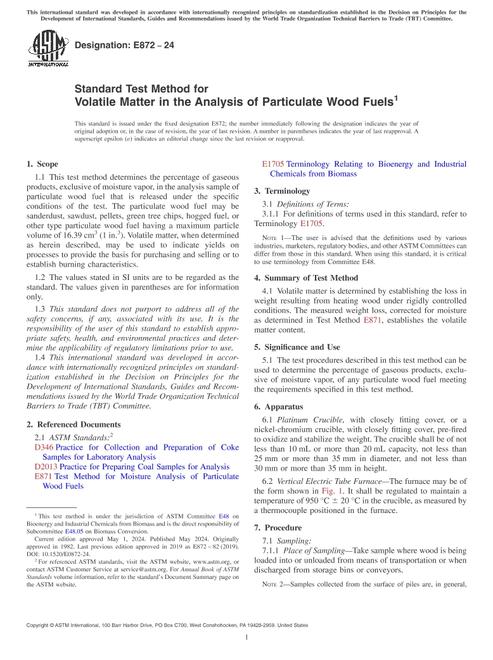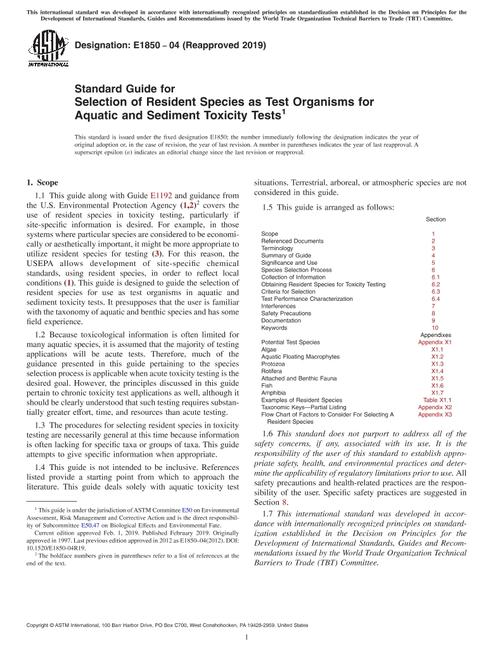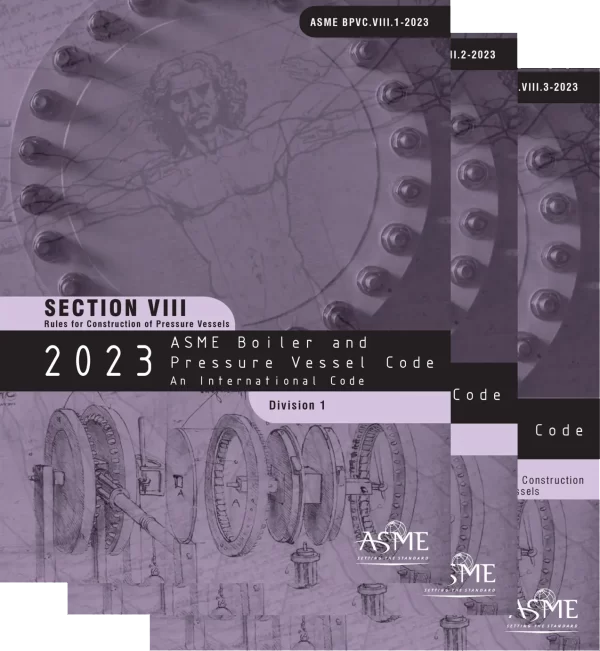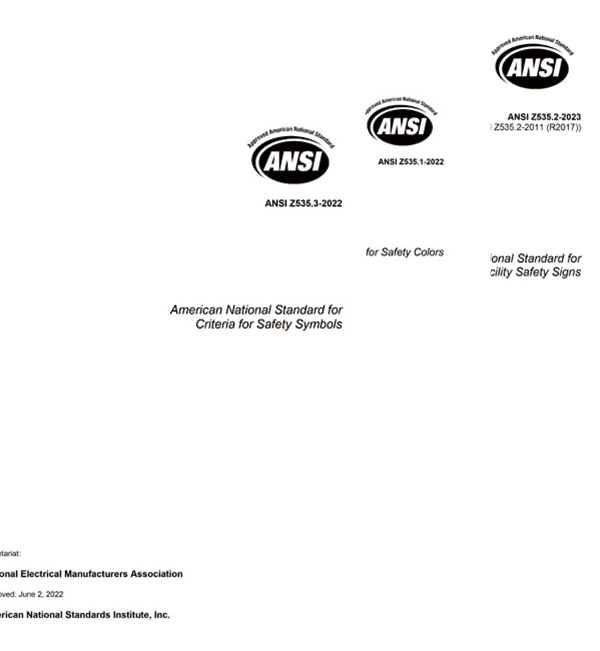ASTM E1611-21
2021
Standard Guide for Conducting Sediment Toxicity Tests with Polychaetous Annelids
- Format:
- Language(s) :
- Published :
- English
- 11/01/2021
1.1''This guide covers procedures for obtaining laboratory data concerning the adverse effects of potentially contaminated sediment, or of a test material added experimentally to contaminated or uncontaminated sediment, on marine or estuarine infaunal polychaetes during 10-day or 20 to 28-day exposures. These procedures are useful for testing the effects of various geochemical characteristics of sediments on marine and estuarine polychaetes and could be used to assess sediment toxicity to other infaunal taxa, although modifications of the procedures appropriate to the test species might be necessary. Procedures for the 10-day static test are described for Neanthes arenaceodentata and Alitta virens 2 (formerly Nereis virens and Neanthes virens) and for the 20 to 28-day static-renewal sediment toxicity for N. arenaceodentata.
1.2''Modifications of these procedures might be appropriate for other sediment toxicity test procedures, such as flow-through or partial life-cycle tests. The methods outlined in this guide should also be useful for conducting sediment toxicity tests with other aquatic taxa, although modifications might be necessary. Other test organisms might include other species of polychaetes, crustaceans, and bivalves.
1.3''Other modifications of these procedures might be appropriate for special needs or circumstances. Although using appropriate procedures is more important than following prescribed procedures, the results of tests conducted using unusual procedures are not likely to be comparable to those of many other tests. Comparisons of the results obtained using modified and unmodified versions of these procedures might provide useful information concerning new concepts and procedures for conducting sediment tests with infaunal organisms.
1.4''These procedures are applicable to sediments contaminated with most chemicals, either individually or in formulations, commercial products, and known or unknown mixtures. These procedures can be used with appropriate modifications to conduct sediment toxicity tests on factors such as temperature, salinity, dissolved oxygen (DO), and natural sediment characteristics (for example, particle size distribution, organic carbon content, and total solids). These procedures can also be used to conduct bioconcentration tests and in situ tests, and to assess the toxicity of potentially contaminated field sediments, or of materials such as sewage sludge, oils, particulate matter, and solutions of toxicants added to sediments. A median lethal concentration (LC50) or median sublethal effect concentration (EC50) of toxicants or of highly contaminated sediment mixed into uncontaminated sediment can be determined. Materials adhering to sediment particles or dissolved in interstitial water can be tested.
1.5''The results of 10-day toxicity tests with contaminated sediments can be reported as a LC50 if a series of concentrations is tested or as a percent mortality relative to a control or reference sediment. The results of 20 to 28-day toxicity tests with contaminated sediments can be reported as a LC50 if a series of concentrations is tested or as a percent mortality or growth relative to a control or reference sediment.
1.6''This guide is arranged as follows:
|
'' |
Section |
|
Referenced Documents |
'''2 |
|
Terminology |
'''3 |
|
Summary of Guide |
'''4 |
|
Significance and Use |
'''5 |
|
Interferences |
'''6 |
|
Apparatus |
'''7 |
|
'''Facilities |
'''7.1 |
|
'''Construction Materials |
'''7.2 |
|
'''Test Chambers |
'''7.3 |
|
'''Cleaning |
'''7.4 |
|
'''Acceptability |
'''7.5 |
|
Hazards |
'''8 |
|
Test Water |
'''9 |
|
'''General Requirements |
'''9.1 |
|
'''Source |
'''9.2 |
|
'''Preparation |
'''9.3 |
|
'''Characterization |
'''9.4 |
|
Test and Control Sediments |
10 |
|
'''General |
10.1 |
|
'''Characterization |
10.2 |
|
'''Control Sediment |
10.3 |
|
'''Field-Collected Test Sediment |
10.4 |
|
'''Reference Sediment |
10.5 |
|
'''Laboratory-Spiked Test Sediment |
10.6 |
|
'''Test Concentration(s) |
10.7 |
|
'''Addition of Toxicant to Sediment |
10.8 |
|
Test Organisms |
11 |
|
''''''Species |
11.1 |
|
''''''Age |
11.2 |
|
''''''Feeding |
11.3 |
|
''''''Source |
11.4 |
|
''''''Collection and Handling |
11.5 |
|
''''''Quality |
11.6 |
|
'''Experimental Design |
12 |
|
''''''Controls |
12.2 |
|
''''''Field Survey Design |
12.3 |
|
''''''Laboratory Experiments |
12.4 |
|
'''Procedure |
13 |
|
''''''Dissolved Oxygen |
13.1 |
|
''''''Temperature |
13.2 |
|
''''''Salinity |
13.3 |
|
''''''Light |
13.4 |
|
''''''Feeding |
13.5 |
|
''''''Beginning of Test |
13.6 |
|
''''''Duration of Test |
13.7 |
|
''''''Biological Data |
13.8 |
|
''''''Other Measurements |
13.9 |
|
'''Analytical Methodology |
14 |
|
'''Acceptability of Test |
15 |
|
'''Interpretation of Results |
16 |
|
'''Report |
17 |
|
'''Keywords |
18 |
|
'''Annexes |
'' |
|
''''''Neanthes arenaceodentata |
Annex A1 |
|
''''''Alitta virens |
Annex A2 |
1.7''The values stated in SI units are to be regarded as standard. No other units of measurement are included in this standard.
1.8''This standard does not purport to address all of the safety concerns, if any, associated with its use. It is the responsibility of the user of this standard to establish appropriate safety, health, and environmental practices and determine the applicability of regulatory limitations prior to use. Specific hazards statements are given in Section 8.
1.9''This international standard was developed in accordance with internationally recognized principles on standardization established in the Decision on Principles for the Development of International Standards, Guides and Recommendations issued by the World Trade Organization Technical Barriers to Trade (TBT) Committee.
| ASTM E1611-21 | |
|---|---|
| STANDARD INFO: | |
| Standard Name | ASTM E1611-21 |
| Scope | Standard Guide for Conducting Sediment Toxicity Tests with Polychaetous Annelids |
| Publisher | ASTM - ASTM International |
| Languages | English |
| State | |
| Publication Year | 2021 |
| Most recent Version | MOST RECENT |
| Whether to be replaced | |
| Addendum | |
| FILE INFO: | |
| File Size | 1 file , 580 KB |
| Note | This product is unavailable in Russia, Ukraine, Belarus |
| Number of Pages | 28 |
| Published | 11/01/2021 |
| Redline File Size | 2 files , 1.3 MB |
| ASTM E1611-21 | ||
|---|---|---|
| History | Publisher Year | |
| ASTM E1611-21 | 2021 | Current |
| ASTM E1611-00(2013) | 2013 | |
| ASTM E1611-00(2007) | 2007 | |
| ASTM E1611-00 | 2000 |
Related products
- Format:
- Language(s) :
- Published :
- English
- 05/01/2024
$27
- Format:
- Language(s) :
- Published :
- English
- 02/01/2019
$27
- Format:
- Language(s) :
- Published :
- English
- 10/10/1999
$25

Over 3,000,000 global standards
Our standards library is extensive, with over 2 million documents, ensuring we meet the needs of various industries. Whether it’s ASME, DIN, ASTM or ISO and other internationally recognized standards, we offer complete documents and the latest versions to help customers adhere to industry regulations in their projects. Whether your needs are technical standards, regulatory requirements, or design guidelines, our standards library provides comprehensive support.
24 online customer service
Our team includes up to 50 engineers from fields such as healthcare, electronics, and construction, who can answer your technical questions and ensure you find the correct and accurate standard documents. We are dedicated to helping you find the best solution that meets your needs.

Thanks to the StandardsClub customer service team for helping me find the ASME BPVC-2023 SET I was looking for in a high-quality PDF version. Their assistance was excellent, and the document quality exceeded my expectations!
This standard document is very detailed, covering all relevant technical points, and provides comprehensive guidance for my project. The ANSI/NEMA Z535 SET was exactly what I needed, and I am very satisfied with the quality!
The purchasing process was straightforward, the price was very competitive, and the download was quick. The Tissue Engineering Standards Addressing Product Quality and Characterization Package was of excellent quality and provided all the information I needed. Definitely a great value for the price!
“Got questions? Our professional customer service is ready to assist you anytime. Whether it’s finding documents, getting discounts, or navigating the purchase process, let us help you get the standards you need!”

Sign Up Our Newsletter
Don’t miss out! Subscribe now to get exclusive offers and industry insights!
We care about your data in ou privacy policy.

